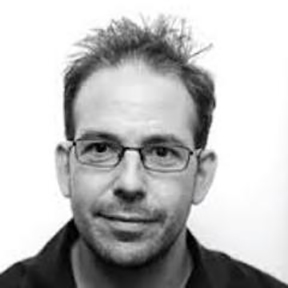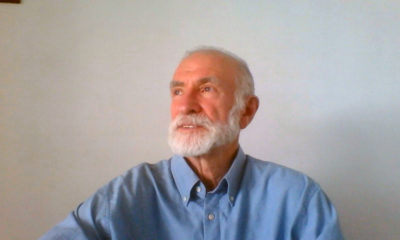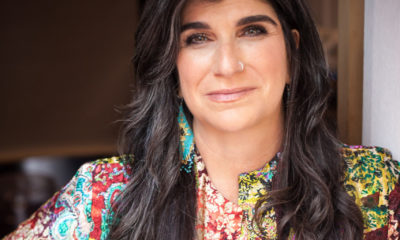
Question and Answer

A politician who doesn’t suffer fools – joining the dots on Pravin Gordhan
Acclaimed journalist and author Jonathan Ancer (and journalist Chris Whitfield) recently published the unauthorised biography of Pravin Gordhan, titled Joining the Dots. The SA Jewish Report asked him some questions.
Why did you agree to write this book?
Pravin Gordhan has been at the centre of many watershed moments in South Africa’s history, and though he’s a household name, not much is known about his background and history in the liberation struggle. He’s an enigma, and I was curious to know more about one of South Africa’s most mysterious personalities. I wanted to understand where he comes from, how he ended up as one of the country’s most powerful politicians, and what motivates him.
You were commissioned to do this, but was there a specific reason in choosing to bring it out now?
There was no specific reason as to the timing other than that the publisher felt it was about time that Gordhan’s story was told.
Describe Pravin Gordhan to us.
He’s a private person, and in spite of his high profile and political prominence, he’s also extremely shy. Every single person we interviewed who has worked with him – from the time he was a student activist to colleagues in cabinet – spoke with admiration (and maybe a hint of envy) about Gordhan’s strategic ability. He’s able to get into the tiny details as well as see the big picture. If I had to choose one word to describe him, though, it would be “principled”.
What kind of research went into this book? Who did you speak to?
We went through press cuttings, testimony before the Truth and Reconciliation Commission, Zondo Commission transcripts, and the (Padraig) O’Malley archives, but most of our research consisted of interviewing a wide range of people Gordhan had encountered over the years. We spoke to Natal activists from the 1970s, his former comrades in the underground, people he campaigned with against the Tricameral Parliament, colleagues who worked with him at the South African Revenue Service (SARS), fellow cabinet ministers, anonymous government sources, economists, and, of course, Gordhan himself.
What role did he play in the research and formulation of the book?
This was an independent project. In other words, it’s an unauthorised biography. It wasn’t a collaboration. Gordhan co-operated with us in the sense that he granted us interviews and allowed us to ask any questions we wanted, but he had no say over the direction of the interviews or the content of the book. He didn’t see what we wrote, and didn’t tell us who to interview and, more importantly, who not to interview.
What did you think of him before starting your research?
I admired him as someone who was prepared to risk everything to stand up to state capture, but – like many South Africans, I guess – I didn’t really know much about him. Fellow author Chris Whitfield and I, both cynical journalists, expected to find some dirt on him, after all, is there such a thing as an honest politician?
How has your opinion changed since writing the book?
After the better part of a year researching and writing this biography, I can say with a lot of confidence that Gordhan is that very rare beast – an honest politician. I also got a glimpse of the depth of his courage and insight into what drives him.
What did you learn about Gordhan and South Africa’s history that really surprised you?
The huge impact that he has had on South Africa’s history: how he pioneered the concept of mass mobilisation; the influential role he played in the formation of the United Democratic Front; the strategic role he played in helping to shepherd the country through the negotiation process; how as SARS commissioner from 1999 to 2009 he turned SARS into a world-class tax authority, one studied by the world’s top business schools. Then, of course, there is more recent history – his fight against the Guptas and the forces of state capture. I also learnt about Gordhan’s role in the underground and how he was detained and tortured. What surprised me the most was the remarkable history of the Natal activists in the 1970s and how it has gone mostly untold. I also didn’t know that the Umgeni River played a crucial role in the toppling of apartheid.
Born on the same day – describe Gordhan’s relationship with Jacob Zuma then and now.
When Zuma came off Robben Island in the mid-1970s, members of Providence – the African National Congress (ANC) unit headed by Gordhan – transported him to meetings with his MK (uMkhonto we Sizwe) handler, Harry Gwala. Gordhan and Zuma continued to work together in the ANC underground after Zuma went into exile and more closely during the ANC’s Operation Vula in the mid to late 1980s. They were once comrades; they are now bitter foes.
Gordhan took on huge and difficult roles in government, positions many would have run from. Why? What does he believe about South Africa?
Gordhan’s mantra is “higher purpose”. He’s committed to improving people’s lives. You may not agree with his methods, but you can’t fault his integrity. He’s aware of the country’s problems but remains optimistic about its future.
He subsequently disapproved of what was going on, and stood up to leadership. How did he get his head around doing that when he had supported the ANC for so long?
Gordhan has always supported the ANC. I don’t think – and I’m surmising here – that he saw corruption as a problem with the ANC itself but rather as a problem with corrupt ANC members even if some of them were/are very senior ANC members. We interviewed Vani, Gordhan’s wife, who was also an activist, and she had interesting things to say about the betrayal of their former comrades.
What does Gordhan think and feel about our government today?
He’s an ally of the president and, while I’m not his spokesperson, I think it’s fair to say that he believes the government is on the right path.
No matter what people believe about Gordhan, he doesn’t suffer fools and has often taken people down with one liners. How did that work for him in government?
He clearly has support, but he also made enemies within government – specifically from the ANC’s “RET faction”. Nevertheless, he always stood his ground.
How did Gordhan react to the book?
We haven’t heard from him yet.










